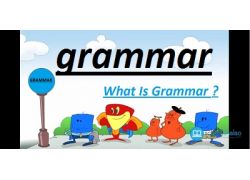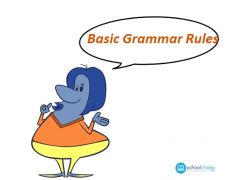Tutorial Library
Learning Point
Articles
English language has two articles, “the and a/an”. An article is used for a noun. An article like an adjective modifies a noun.
For example, a book, the book, a cup, the cup, an umbrella, the umbrella
The article “the” is called definite article and the article “a/an” is called indefinite article.
Types of Articles
There are two articles in English language.
1. Indefinite article: a/an
2. Definite article: the
An article is used before a noun or an adjective modifying a noun.
Definite Article: (the)
The definite article "the" is used for a definite, specific or particular noun.
Example. He bought the shirt.
The article “the” before the noun “shirt” in above sentence means that the shirt, he bought, is a specific or particular shirt and not any shirt.
Indefinite Article: (a/an)
The definite article “a/an” is used for indefinite, non-specific or non-particular (common) noun.
Example. He bought a shirt.
The article “a” before shirt in above sentence means that the shirt he bought is any shirt and not a specific shirt.
Rules for using Indefinite Article (a/an)
The article form “a” is used before a word (singular) beginning with a consonant, or a vowel with a consonant sound.
e.g. a book, a cat, a camera, a university, a European
The article form “an” is used before a word (singular) beginning with a vowel (a, e, i, o, u) or consonant with vowel sound (or beginning with mute h ).
e.g. an apple, an elephant, an umbrella, an hour,
1. Before a singular noun which is countable
e.g. He bought a book
She is eating an apple.
2. Before a singular noun which refers to a class of things.
e.g. An orange is rich in vitamins.
3. Before a name of a profession
e.g. She wants to be a doctor
He is an engineer.
4. For certain expressions of quantity
e.g. a lot of, a few, a couple, a dozen
5. For certain numbers.
e.g. a hundred, a thousand, a million
6. Before a singular, countable noun in exclamation.
e.g. What a beautiful flower!
What a nice shirt!
7. Article a/an is not used before uncountable nouns
e.g. water, milk, sand etc
Rules for using definite Article (the)
The article “the” can be used both before a singular and plural noun according to the following grammatical rules. e.g. the book, the books
1. Before the place, object or group of object which is unique or considered to be unique and geographical region and points on globe.
e.g. the earth, the moon, the sky, the stars, the north pole, the equator
2. For a noun which becomes definite or particular because it is already mentioned and is being mentioned a second time.
e.g. The teacher helped a student and the student became happy.
3. For a noun made specific or definite in a clause or a phrase.
e.g. The old lady, The girl with blue eyes, The boy that I saw, The nice red shirt
4. Before superlatives, and first, second. Etc, and only
e.g. The best day, The only method, the second month,
5. Before a phrase composed of a proper and common noun
e.g. The New York city, The river Nile, The library of Congress
6. Before the names of organizations
e.g. The Association of Chartered Accountants, The World Health Organization
7. Before names of scientific principles, theories, laws etc. e.g. the Pythagorean Theorem, the laws of Newton, The Fahrenheit Scale. But no article will be used for these names if written in forms like, Newton’s Law, Dalton’s Law of Partial Pressures, and Hook’s Law of Elasticity
8. Article “the” is not used for names of universities if written in forms like Oxford University, Yale University, and Columbia University. But article “the” is used if names of university are written in forms like The University of Oxford, The University of Yale, The University of Toronto.
9. Article “the” is not used for names of countries of places. e.g. New York, America, Mexico, Japan, London. But article “the” is used for a name, if it expresses a group of place, states, or land. e.g. The United States, The Philippines, The Netherlands
Very Useful (0)
Useful (0)
Not Useful (0)
Please login to your account by completing this form
Reset Your password
Please enter the email address you signed up with and we'll send you a password reset link.
A reset password link has been generated and will be sent to you via email.
You can then follow that link and select a new password.
Completing that action will allow you to reset your password and then you can insert a new one.
Please enter the email address you signed up with and we'll send you a password reset link.
A reset password link has been generated and will be sent to you via email.
You can then follow that link and select a new password.
Completing that action will allow you to reset your password and then you can insert a new one.





